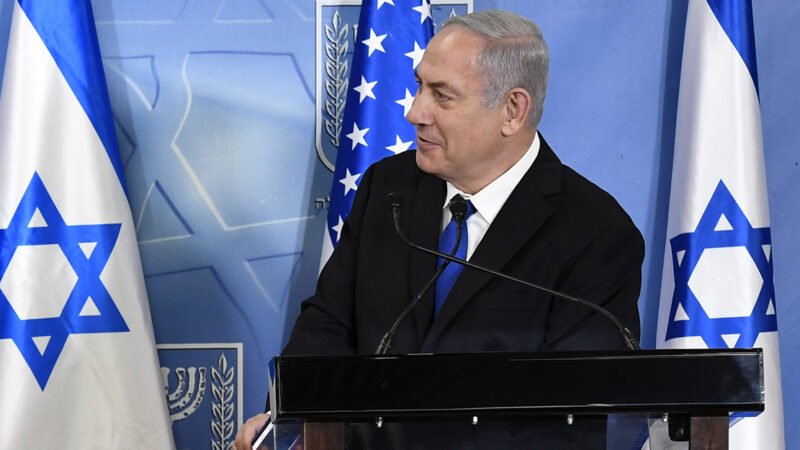
Israel is not just dealing with the coronavirus crisis but with the latest phase of its political crisis, and the two have now become entangled. Israelis went to the polls on March 2nd for an unprecedented third general election in just 11 months. On election night, incumbent Prime Minister Benjamin Netanyahu’s right-wing block of parties looked like it had emerged triumphant and finally broken the deadlock whereby nobody had been able to form a 61-seat majority government in Israel’s 120-member parliament in the two previous elections.
Since then, it has been a rollercoaster ride. The final results two days later instead showed a narrow 62 to 58 majority for anti-Netanyahu parties. It seemed to suggest that the main centrist opposition party, Blue and White, could form a government with the left – now merged as Labor-Gesher-Meretz and squeezed to a rump of just seven seats – and the maverick former right-wing foreign minister Avigdor Lieberman, with tacit support from the coalition of the ‘Joint List’ representing Israel’s Arab minority, which had a good election and won 15 seats.
Days later, the two most right-wing members of the Blue and White Knesset group appeared to torpedo this by saying they could not be part of a government sustained by the support of Arab parliamentarians. There was also uproar and cries of betrayal from Labour and Meretz after the leader of the small Gesher Party, Orly Levy, elected by left-wing votes, made a similar statement and said she was pulling her party out of the left’s Knesset group.
Last week, coronavirus became a far bigger story, and it seemed to increase Netanyahu’s chances of staying on as head of an emergency national unity government – particularly as the virus led to the delay of his trial on corruption charges from March 17th to May 24th. This week, however, the momentum swung behind Blue and White party chairman Benny Gantz.
The whole Arab Joint List – including, unexpectedly, the controversial Balad party – informed President Rivlin that they were recommending that Gantz should be Prime Minister. As did Avigdor Lieberman’s secular nationalists. With Gantz being recommended by parties holding 61 seats out of 120, Rivlin has offered him the first go at forming a government. And while it’s unlikely that he can actually form a government that doesn’t include Likud, Blue and White intends to use Gantz’s mandate to take control of the parliamentary process.
It wants to replace Knesset speaker Yuli Edelstein with their own candidate and pass a law barring an indicted Prime Minister from serving in office in future – starting in the next Knesset. It also wants to increase parliamentary oversight of the Netanyahu caretaker government – particularly in relation to far-reaching coronavirus measures, such as tracking of infected individuals’ movements via their mobile phones, which some opposition members view as infringing on civil rights.
Likud counter-attacked on Wednesday. With Netanyahu attacking the Arab Joint List as “terrorist supporters”, speaker Edelstein abruptly adjourned the Knesset after just a few minutes – curtailing the opposition’s measures, including his own removal. Gantz reacted angrily, saying: “Likud lacks a majority in the Knesset – so it has gone ahead and closed it. We won’t allow that. The Knesset is a critical institution at all times, including times of crisis.”
President Rivlin, who is also a Likud member but a critic of Netanyahu and a champion of democratic norms, told Edelstein: “A Knesset that is out of action harms the ability of the state of Israel to function well and responsibly in an emergency. We must not let this crisis, as serious as it is, harm our democratic system.”
Meanwhile, the interim government has been taking strict measures to stop the spread of coronavirus, banning all non-citizens and residents from entering the country and deploying the security services’ cyber tracking tools, normally reserved to find terrorists, to trace infected individuals and their contacts.
There have been no deaths so far, but the number of cases has reached 529. Israel is also cooperating with the Palestinian Authority, where there are 47 cases, and supplying the PA with testing kits and protective equipment. Gaza has zero cases, reflecting its isolation from the outside world, with Hamas closing the main crossings to Israel and Egypt.
Behind, the scenes, negotiators from the two big parties have been meeting to thrash out the possibility of an emergency national unity government. Netanyahu is viewed by many Israelis as competent at times of crisis, and he seems to be playing for time until Gantz’s 28-day limit to form a government runs out. Coronavirus may overshadow his criminal trial, and his failure to form a viable governing coalition to the extent that he somehow manages to stay on as Prime Minister – but in an uneasy partnership with Gantz and his centrists.
The Zionist left – including Labour, which was the founding party of the state and dominated its early history – has been supplying six of the Knesset votes that got Gantz the right to try and form a government. It is now utterly marginalised. Perhaps the only way back would be if it stays out of government and attracts voters back from Blue and White who don’t like the idea of a ‘grand coalition’ with Likud, should that happen.
Luke Akehurst is writing in his capacity as director of We Believe in Israel.




More from LabourList
‘Labour’s quiet quest for democratic renewal’
‘Labour promised to make work pay. Now it must deliver for young people’
‘Council Tax shouldn’t punish those who have the least or those we owe the most’